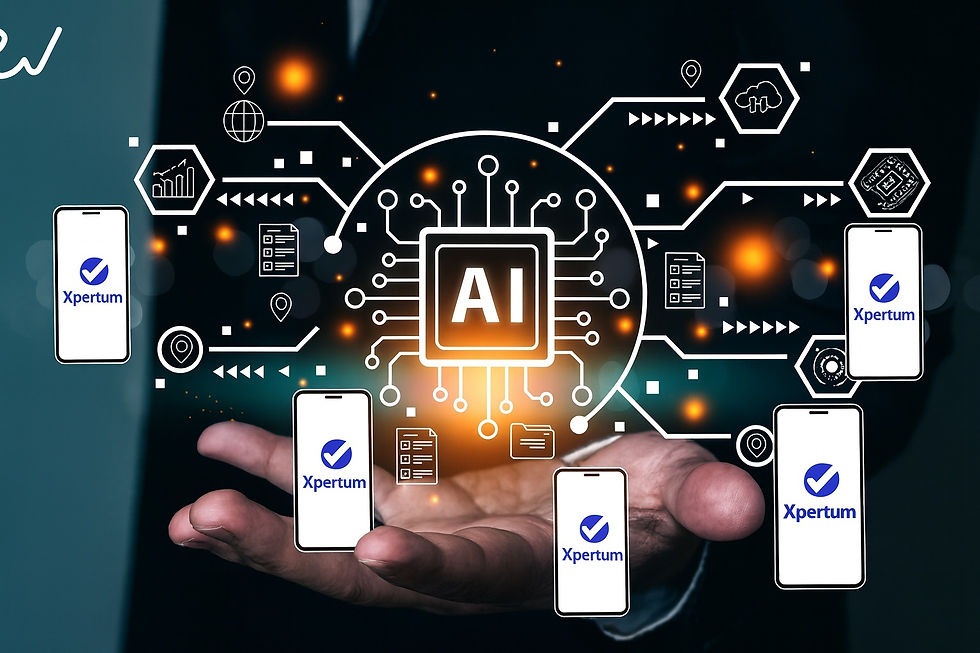Benefits of Digitalization and Emerging Technologies for Business Transformation
- DEAO

- Jul 23
- 2 min read
Introduction
Before acquiring software, implementing an online platform, or integrating Artificial Intelligence (AI) tools, ensure that your internal processes are clearly defined.This preparatory step is essential to unlock the real value of digitalization and technological innovation.
Having documented workflows and structured templates allows your team or external consultants to identify areas for improvement, automation, and growth.This will help you maximize your technology investment and accelerate the adoption of advanced tools such as AI, intelligent automation, and custom application development.
Key Benefits of Advanced Digitalization
1. Physical Space and Resource Savings
By going digital, companies reduce their dependency on printed documents and physical archives.This liberates office space for more strategic purposes, such as coworking areas or innovation labs.
2. Process Standardization and Intelligent Automation
Digital platforms often follow industry best practices. Modern tools allow companies to automate repetitive tasks through low-code/no-code platforms or even AI-powered bots.This improves consistency, reduces errors, and increases operational efficiency.
💡 Tip: Carefully evaluate how to tailor these tools to your specific context. Not all features are plug-and-play.
3. Advanced Segmentation and Personalization with AI
With access to data analytics and AI models, businesses can now segment their audiences with high precision, predict behaviors, and offer personalized products or messages.Big Data is no longer a luxury—it’s a competitive necessity.
4. Data-Driven Decision Making
Digitalization supports the structured collection of real-time data, which—when paired with BI tools or AI assistants—enables decision-making based on predictive analytics, simulations, and trends.
5. Scalability and AI-Based Application Development
Today, companies can build apps enhanced with AI capabilities such as language understanding, image recognition, and voice interaction.Frameworks like LangChain, TensorFlow, and Hugging Face allow custom development of apps with cognitive capabilities.
Toolset to Digitalize and Scale with Technology
🔧 Administration and Productivity
Notion AI – for centralized knowledge and docs with generative AI.
ClickUp – project and task management with automations and AI assistant.
Miro – collaborative whiteboard for remote teams, brainstorming, and process mapping.
💼 Finance and Automation
Alegra – cloud-based accounting tailored for SMEs.
QuickBooks + Zapier – automated invoicing, reporting, and system integration.
ChatGPT for Finance – real-time assistance for financial modeling, planning, and reporting.
☁️ Storage and Collaboration
Google Drive + Gemini AI – AI-enhanced search, summaries, and content assistance.
Notion / Coda – flexible docs, databases, and collaborative workspace.
WeTransfer Pro – large file sharing with brand customization and expiry control.
🤖 Development and Innovation
Glide / Appgyver / FlutterFlow – no-code app builders with AI modules.
LangChain + OpenAI / Gemini – create intelligent assistants, bots, or workflow automation tools.
Retool / Supabase – admin panels and frontends built on top of real-time databases.
Strategic Recommendations
Assess your organization's digital maturity before integrating emerging tech.
Prioritize real, measurable use cases where technology adds clear value.
Provide training and governance for responsible use of AI tools.
Align innovation initiatives with long-term business strategy and customer needs.
Conclusion
Digitalization is no longer optional—it is a strategic requirement to compete and grow.Emerging technologies like AI, automation, and intelligent app development significantly multiply its benefits.
Going digital with a strategic mindset is not about adopting tools—it's about redesigning how your company creates and delivers value.










Comments